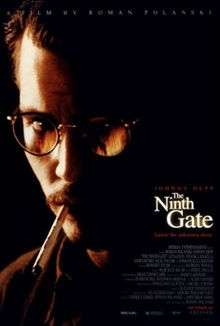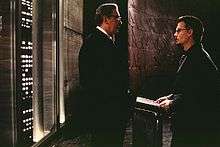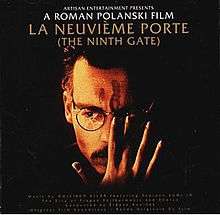The Ninth Gate
| The Ninth Gate | |
|---|---|
 Theatrical release poster | |
| Directed by | Roman Polanski |
| Produced by | Roman Polanski |
| Screenplay by |
|
| Based on |
The Club Dumas by Arturo Pérez-Reverte |
| Starring | |
| Music by | Wojciech Kilar |
| Cinematography | Darius Khondji |
| Edited by | Hervé de Luze |
Production company | |
| Distributed by |
|
Release dates |
|
Running time | 133 minutes[1] |
| Country |
|
| Language |
|
| Budget | $38 million |
| Box office | $58.4 million |
The Ninth Gate is a 1999 French-Spanish-American mystery thriller film directed, produced, and co-written by Roman Polanski. The film is loosely based upon Arturo Pérez-Reverte's 1993 novel The Club Dumas. The plot involves the search for a rare, ancient book that purportedly contains a magical secret for summoning the Devil. The premiere showing was at San Sebastián, Spain, on 25 August 1999, a month before the 47th San Sebastian International Film Festival. Though critically and commercially unsuccessful in North America, where reviewers compared it unfavorably with Polanski's celebrated supernatural film Rosemary's Baby of 1968, The Ninth Gate earned a worldwide gross of $58.4 million against a $38 million budget.
Plot

Dean Corso (Johnny Depp), a New York City rare book dealer, makes his living conning people into selling him valuable antique books for a low price, and then re-selling them to private collectors. Corso meets with wealthy book collector Boris Balkan (Frank Langella), who has recently acquired a copy of the (fictional) book The Nine Gates of the Kingdom of Shadows by 17th-century author Aristide Torchia, one of only three extant copies. The book is an adaptation of one written by the Devil himself and purportedly contains the means to summon the Devil and acquire invincibility and immortality. Balkan believes two of the copies are forgeries. He hires Corso to check all three, and acquire the legitimate one by any means necessary.
Balkan's copy was acquired from Andrew Telfer (Willy Holt), who killed himself soon after. Telfer's widow Liana (Lena Olin) seduces Corso, in a failed attempt to get the book back. Meanwhile, Corso leaves the book for safekeeping with bookseller Bernie Rothstein (James Russo), who is then murdered; his corpse is found posed like an engraving in The Nine Gates.
Corso travels to Toledo, Spain. The Ceniza brothers, book restorers, show him that three of the engravings are signed "LCF". Corso deduces that Lucifer himself designed and cut them. Corso travels to Sintra, Portugal, to compare Victor Fargas' (Jack Taylor) copy of the book to Balkan's. To Corso's surprise, he discovers that the signature "LCF" is found in three different engravings, which vary in small but significant details from the images in the Balkan copy. The next morning, a mysterious young woman (identified only as "the Girl") (Emmanuelle Seigner) who appears to have been shadowing Corso since Balkan hired him, awakens Corso and leads him to Fargas' house. He finds the old man murdered and the "LCF"-signed engravings ripped out of that copy.
In Paris, Corso visits the Baroness Kessler (Barbara Jefford), who owns the third copy. At first the Baroness refuses to cooperate, but Corso intrigues her with evidence that the engravings differ among the three copies. He explains his idea: each copy contains three different "LCF"-signed engravings, therefore all three copies are required for the ritual. Corso finds "LCF" on three different engravings in the Baroness's book confirming his theory.
Kessler is killed, and the Girl rescues Corso from Liana's bodyguard. When Liana steals Balkan's copy from Corso's hotel room, he follows her, and witnesses her using the book in a Satanist ceremony. Balkan suddenly interrupts the ceremony, kills Liana, and leaves with the engraved pages and his own intact copy.
Corso pursues Balkan to a remote castle, depicted in one of the engravings, and finds Balkan preparing the final ritual. After a struggle, Balkan traps Corso in a hole in the floor. Balkan performs his summoning ritual: he arranges the engravings on a makeshift altar, and recites a series of phrases related to each of the nine engravings. Balkan then douses the floor and himself with gasoline and sets it alight, believing himself to be immune to suffering. Balkan's invocation fails, and he screams in pain as the flames engulf him. Corso frees himself, kills Balkan, takes the engravings, and escapes.
Outside, the Girl appears and has sex with him by the light of the burning castle. She tells him that Balkan failed because the ninth engraving he had used was a forgery. On her suggestion, Corso returns to the Ceniza brothers' now vacant shop. By chance he finds the authentic ninth engraving. On it, there is a likeness of the Girl. With the last engraving in hand, Corso returns to the castle. He has completed the ritual requirements, and he crosses through the Ninth Gate into the light.
Cast
- Johnny Depp as Dean Corso
- Lena Olin as Liana Telfer
- Frank Langella as Boris Balkan
- Emmanuelle Seigner as The Girl
- James Russo as Bernie Rothstein
- Jack Taylor as Victor Fargas
- José López Rodero as Pablo & Pedro Ceniza/1st & 2nd Workmen
- Allen Garfield as Witkin
- Barbara Jefford as Baroness Frida Kessler
- Willy Holt as Andrew Telfer
- Catherine Benguigui as The concierge
- Tony Amoni as Liana's bodyguard
- Maria Ducceshi as The secretary
Production
Roman Polanski read the screenplay by Enrique Urbizu, an adaptation of the Spanish novel El Club Dumas (The Club Dumas, 1993), by Arturo Pérez-Reverte. Impressed with the script, Polanski read the novel, liking it because he "saw so many elements that seemed good for a movie. It was suspenseful, funny, and there were a great number of secondary characters that are tremendously cinematic".[2] Pérez-Reverte's novel, El Club Dumas features intertwined plots, so Polanski wrote his own adaptation with his usual partner, John Brownjohn (Tess, Pirates and Bitter Moon). They deleted the novel's literary references and a sub-plot about Corso's investigation of an original manuscript of a chapter of The Three Musketeers and concentrated upon Dean Corso's pursuing the authentic copy of The Nine Gates.[2]
Polanski approached the subject skeptically, saying, "I don't believe in the occult. I don't believe. Period."[3] Yet he enjoyed the genre. "There [are] a great number of clichés of this type in The Ninth Gate, which I tried to turn around a bit. You can make them appear serious on the surface, but you cannot help but laugh at them."[3] The appeal of the film was that it featured "a mystery in which a book is the leading character" and its engravings "are also essential clues".[4]
In reading El Club Dumas, Polanski pictured Johnny Depp as "Dean Corso", who joined the production as early as 1997, when he met Polanski at the Cannes Film Festival, while promoting The Brave, his directorial debut, then in festival competition.[5] Initially, he did not think Depp right as "Corso", because the character was forty years old (Depp at the time was only 34). He considered an older actor, but Depp persisted; he wanted to work with Roman Polanski.[6]
The film press reported, around the time of the North American release of The Ninth Gate, creative friction between Depp and Polanski. Depp said, "It's the director's job to push, to provoke things out of an actor".[6] Polanski said of Depp, "He decided to play it rather flat, which wasn't how I envisioned it; and I didn't tell him it wasn't how I saw it". Visually, in the neo-noir genre style, rare-book dealer Dean Corso's disheveled grooming derives from Philip Marlowe, Raymond Chandler's quintessential literary private investigator.[3]
Polanski cast Frank Langella as Boris Balkan based upon his performance as Clare Quilty in Lolita (1997), directed by Adrian Lyne. Barbara Jefford was a last-minute replacement for the German actress originally cast as the Baroness Frida Kessler, who fell sick with pneumonia, and after a second actress proved unable to learn the character's dialogue; with only days' notice, Barbara Jefford learned her part, spoken with a German accent.[2] Depp met his long-time partner Vanessa Paradis during the shooting.
Filming
The Ninth Gate was filmed in France, Portugal, and Spain in the summer of 1998. Selected prominent buildings in the film are:
- Challet Biester, Rampa da Pena, Sintra, Lisbon, Portugal (Mansion of Victor Fargas).
- Château de Ferrières, Seine-et-Marne, France
- Château de Puivert, Aude, France
- Château des Cathares, Ariège, France
- Toledo, Castilla-La Mancha, Spain [7]
Soundtrack
| The Ninth Gate (Original Motion Picture Soundtrack) | |
|---|---|
 | |
| Soundtrack album by Wojciech Kilar | |
| Released | November 16, 1999 |
| Recorded | Score recorded at "Smecky" Studios, Prague, March 1999. |
| Genre | Soundtrack |
| Length | 53:58 |
| Label | Silva Screen SSD 1103 |
| Producer | Reynold da Silva, Gwen Bethel |
| Professional ratings | |
|---|---|
| Review scores | |
| Source | Rating |
| Allmusic | |
| Filmtracks | |
The musical score for The Ninth Gate was composed by Wojciech Kilar, who previously collaborated with Polanski on Death and the Maiden (1994). The film's main theme is loosely based upon Havanaise, for violin and orchestra, by Camille Saint-Saëns;[10] some of the score is a vocalise by Korean soprano Sumi Jo.[11] A soundtrack album was released on November 16, 1999 via Silva Screen label.
- Vocalise: "Theme from the Ninth Gate" – 3:56
- "Opening Titles" – 3:31
- "Corso" – 3:24
- "Bernie is Dead" – 4:31
- "Liana" – 3:03
- "Plane to Spain" – 4:48
- "The Motorbike" – 1:18
- "Missing Books" - 4:41
- "Blood on His Face" – 1:13
- "Chateau Saint Martin" – 4:05
- "Liana's Death" – 2:38
- "Boo! / The Chase" – 4:29
- "Balkan's Death" – 3:52
- "The Ninth Gate" – 1:13
- "Corso and the Girl" – 3:20
- Vocalise: Theme from the Ninth Gate (Reprise) – 3:56
Release
Box office
The premiere screening of The Ninth Gate was in San Sebastián, Spain, on 25 August 1999; in North America, it appeared in 1,586 cinemas during the March 10th, 2000 weekend, earning a gross income of $6.6 million, and $18.6 million in total. Worldwide, it earned $58.4 million against a $38 million production budget.[12]
Critical response
The film received mixed reviews. The Ninth Gate holds a 41% rating at Rotten Tomatoes and a metascore of 44 on Metacritic. Most movie reviewers said that the suspense in The Ninth Gate was less than that of Rosemary's Baby (1968), director Polanski's famous supernatural-themed film. Roger Ebert said the ending was lackluster, "while at the end, I didn't yearn for spectacular special effects, I did wish for spectacular information — something awesome, not just a fade-to-white".[13] In his review for The New York Times, Elvis Mitchell said the movie was "about as scary as a sock-puppet re-enactment of The Blair Witch Project, and not nearly as funny".[14] Entertainment Weekly rated the film "D+", and Lisa Schwarzbaum said it had an "aroma of middle-brow, art-house Euro-rot, a whiff of decay and hauteur in a film not even a star as foxed, and foxy, as Johnny Depp, himself, could save".[15] In the Los Angeles Times, Kenneth Turan said the film was "too laid-back, and unconcerned about the pacing of its story to be satisfying", because "a thriller that's not high-powered, is an intriguing concept, in reality it can hold our attention for only so long".[16] In the Village Voice, J. Hoberman said the film was "barely releasable hokum, stuffed with cheesy blah-blah".[17] European reviews were generally more attentive and praised the film's fine pace and irony.[18][19]
In Sight and Sound magazine, Phillip Strick said it was "not particularly liked at first outing — partly because Johnny Depp, in fake grey temples, personifies the odious Corso of the book a little too accurately — the film is intricately well-made, deserves a second chance, despite its disintegrations, and, in time, will undoubtedly acquire its own coven of heretical fans".[20]
In Time magazine, Richard Corliss said that The Ninth Gate was Polanski's most accessible effort "since fleeing the U.S. soon after Chinatown".[21]
In the San Francisco Chronicle, Bob Graham said that "Depp is the best reason to see Polanski's satanic thriller" and "Polanski's sly sense of film-noir conventions pokes fun at the genre, while, at the same time, honoring it".[22]
On his website Groucho Reviews, web critic Peter Canavese called the film "an insinuating trip into devilish darkness" and a "sorely underrated occult mystery".[23]
After the release of The Ninth Gate, Artisan sued Polanski for taking more than $1 million from the budget, refunds of France's value-added tax that he did not give to the completion bond company guaranteeing Artisan Entertainment a completed film.[24]
References
- ↑ "THE NINTH GATE (15)". British Board of Film Classification. 17 January 2000. Retrieved 7 June 2015.
- 1 2 3 Hartl, John (March 5, 2000). "The Ninth Gate Marks Return for Polanski". Seattle Times.
- 1 2 3 Howell, Peter (March 3, 2000). "Polanski's Demons". Toronto Star.
- ↑ Arnold, Gary (March 11, 2000). "Polanski's Dark Side". Washington Times.
- ↑ Archerd, Army (February 10, 1998). "Polanski opens Gate". Variety.
- 1 2 Schaefer, Stephen (March 10, 2000). "The Devil and Roman Polanski". Boston Herald.
- ↑ www.imdb.com Filming locations for The Ninth Gate. Retrieved 2013-01-18.
- ↑ Phares, Heather. The Ninth Gate at AllMusic
- ↑ Filmtracks review
- ↑ "The Ninth Gate (1999) - Soundtracks". Retrieved May 2013. Check date values in:
|access-date=(help) - ↑ Phares, Heather. "The Ninth Gate". allmusic.com. Retrieved 2007-05-18.
- ↑ "The Ninth Gate". Box Office Mojo. May 18, 2007. Retrieved 2007-05-18.
- ↑ Ebert, Roger (March 10, 2000). "The Ninth Gate". Chicago Sun-Times. Retrieved 2007-05-18.
- ↑ Mitchell, Elvis (March 10, 2000). "Off to Hell in a Handbasket, Trusty Book in Hand". The New York Times. Retrieved 2007-11-09.
- ↑ Schwarzbaum, Lisa (March 17, 2000). "The Ninth Gate". Entertainment Weekly. Retrieved 2009-04-09.
- ↑ Turan, Kenneth (March 10, 2000). "The Ninth Gate". Los Angeles Times. Archived from the original on 29 September 2009. Retrieved 2009-04-09.
- ↑ Hoberman, J (March 14, 2000). "Missions Impossible". Village Voice. Retrieved 2009-04-09.
- ↑ cinema.de
- ↑ kino.de
- ↑ Strick, Philip (September 2000). "The Ninth Gate". Sight and Sound. Archived from the original on 14 February 2006. Retrieved 2007-05-18.
- ↑ Corliss, Richard (March 27, 2000). "The Ninth Gate". Time. Retrieved 2009-04-09.
- ↑ Graham, Bob (March 10, 2000). "Summoning Silliness". San Francisco Chronicle. Retrieved 2009-04-09.
- ↑ http://www.grouchoreviews.com/reviews/3537
- ↑ Shprintz, Janet (July 18, 2000). "Artisan Sues Polanski, Alleges He Took Money". Variety. Retrieved 2007-05-22.
External links
- The Ninth Gate at the Internet Movie Database
- The Ninth Gate at Box Office Mojo
- The Ninth Gate at Rotten Tomatoes
- The Ninth Gate at Metacritic
- Texts, engravings and formatting of the book at the Wayback Machine (archived 5 September 2004)
- "Satanic Verses" article from American Cinematographer magazine
_-_Arri%C3%A8re.jpg)